Explain the Role of Reflection in Health and Social Care Practice
VerifiedAdded on 2023/01/13
|11
|3146
|91
Report
AI Summary
This report comprehensively examines the role of reflection in health and social care practice. It begins by defining the purpose of reflection, emphasizing its importance for healthcare professionals' skill enhancement and career development. The report then delves into various reflective models, with a detailed explanation of Gibbs' reflective cycle, including its six stages: description, feelings, evaluation, analysis, conclusion, and action plan. It further explores the practical application of reflective practice, such as using reflective models and peer group inquiry. The report also discusses personal reflection's role in personal and professional development, providing examples of how reflection aids skill improvement. Additionally, it highlights practice themes that underpin reflection and their link to performance indicators, using examples of ethical practice and professional values. The report concludes by emphasizing the importance of linking practice themes and performance indicators for effective healthcare practice.
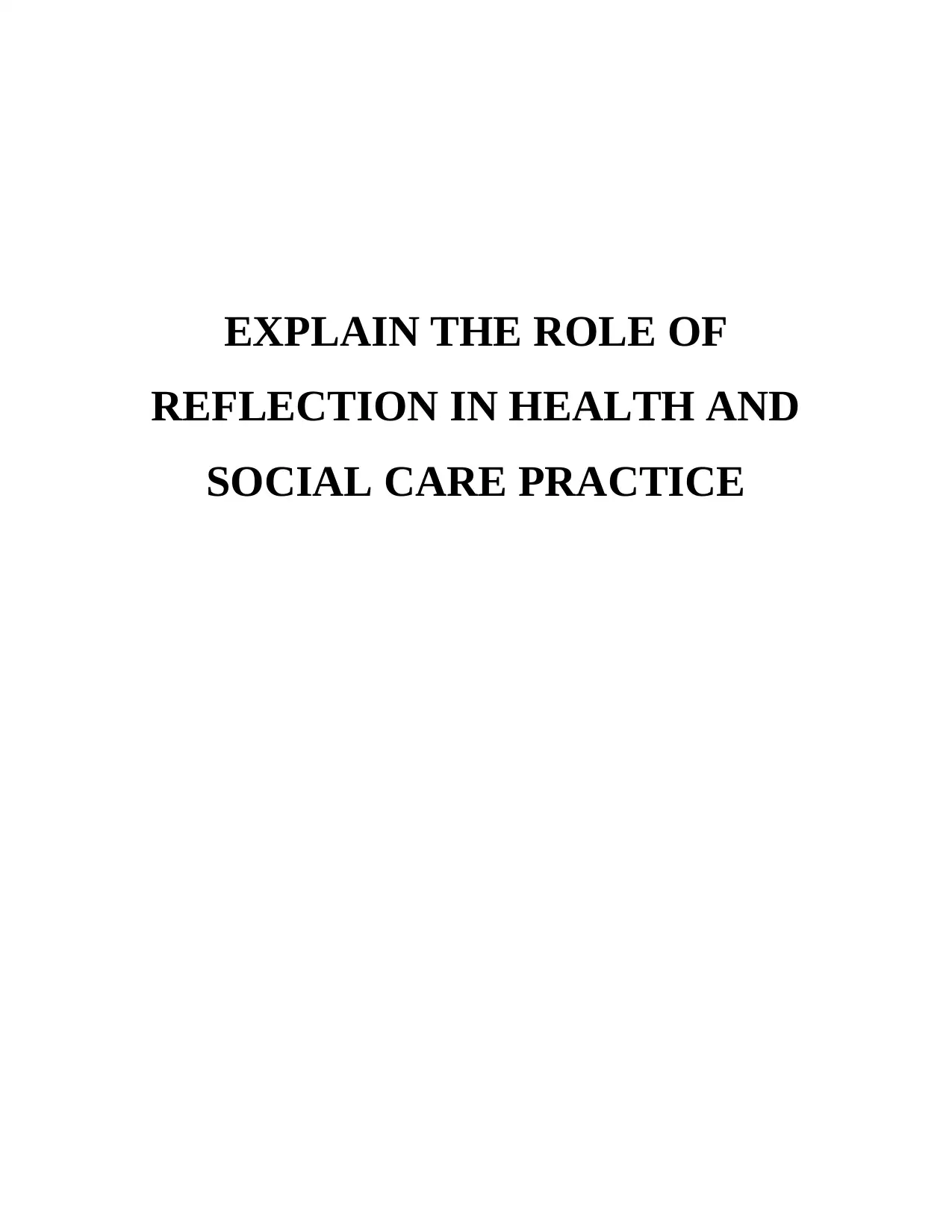
EXPLAIN THE ROLE OF
REFLECTION IN HEALTH AND
SOCIAL CARE PRACTICE
REFLECTION IN HEALTH AND
SOCIAL CARE PRACTICE
Paraphrase This Document
Need a fresh take? Get an instant paraphrase of this document with our AI Paraphraser
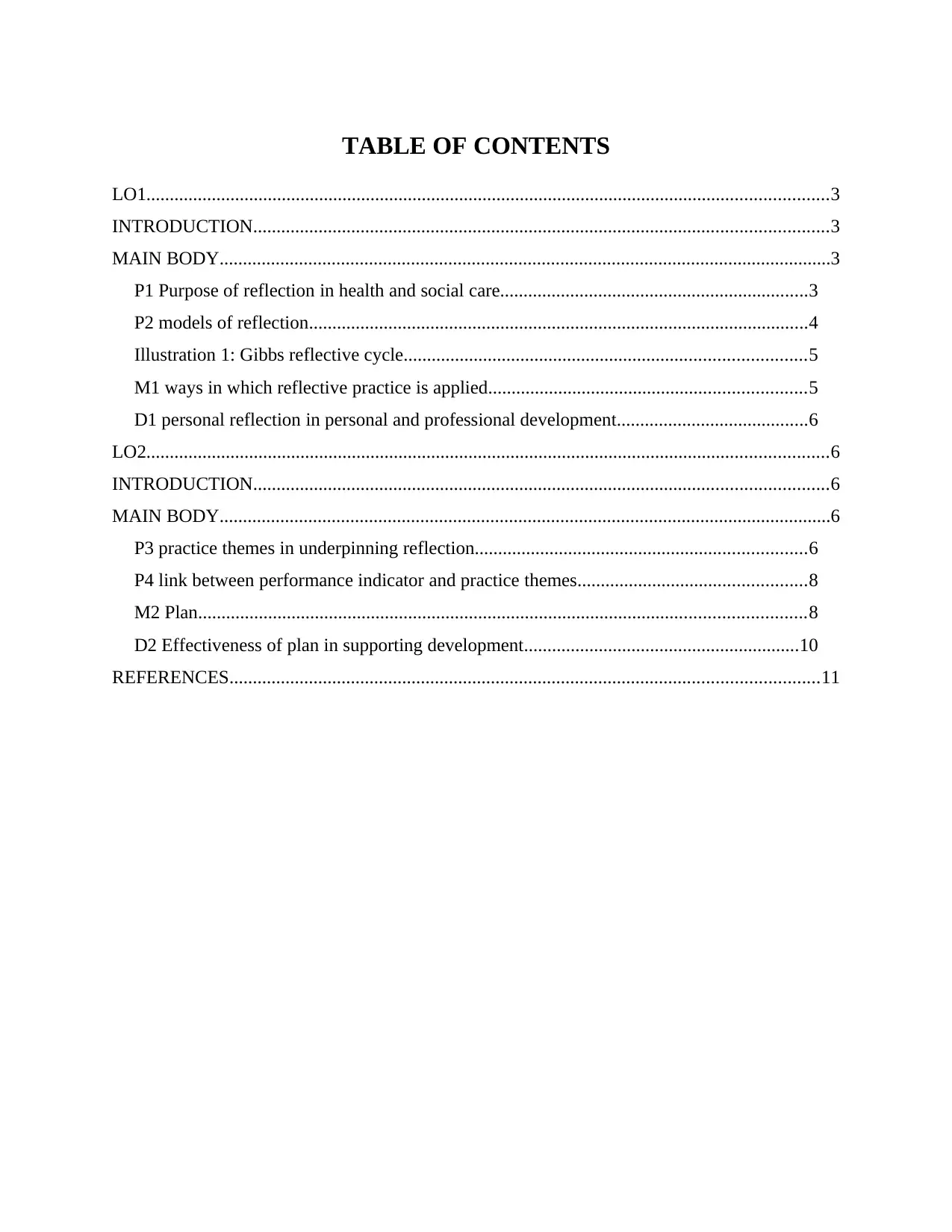
TABLE OF CONTENTS
LO1..................................................................................................................................................3
INTRODUCTION...........................................................................................................................3
MAIN BODY...................................................................................................................................3
P1 Purpose of reflection in health and social care..................................................................3
P2 models of reflection...........................................................................................................4
Illustration 1: Gibbs reflective cycle......................................................................................5
M1 ways in which reflective practice is applied....................................................................5
D1 personal reflection in personal and professional development.........................................6
LO2..................................................................................................................................................6
INTRODUCTION...........................................................................................................................6
MAIN BODY...................................................................................................................................6
P3 practice themes in underpinning reflection.......................................................................6
P4 link between performance indicator and practice themes.................................................8
M2 Plan..................................................................................................................................8
D2 Effectiveness of plan in supporting development...........................................................10
REFERENCES..............................................................................................................................11
LO1..................................................................................................................................................3
INTRODUCTION...........................................................................................................................3
MAIN BODY...................................................................................................................................3
P1 Purpose of reflection in health and social care..................................................................3
P2 models of reflection...........................................................................................................4
Illustration 1: Gibbs reflective cycle......................................................................................5
M1 ways in which reflective practice is applied....................................................................5
D1 personal reflection in personal and professional development.........................................6
LO2..................................................................................................................................................6
INTRODUCTION...........................................................................................................................6
MAIN BODY...................................................................................................................................6
P3 practice themes in underpinning reflection.......................................................................6
P4 link between performance indicator and practice themes.................................................8
M2 Plan..................................................................................................................................8
D2 Effectiveness of plan in supporting development...........................................................10
REFERENCES..............................................................................................................................11
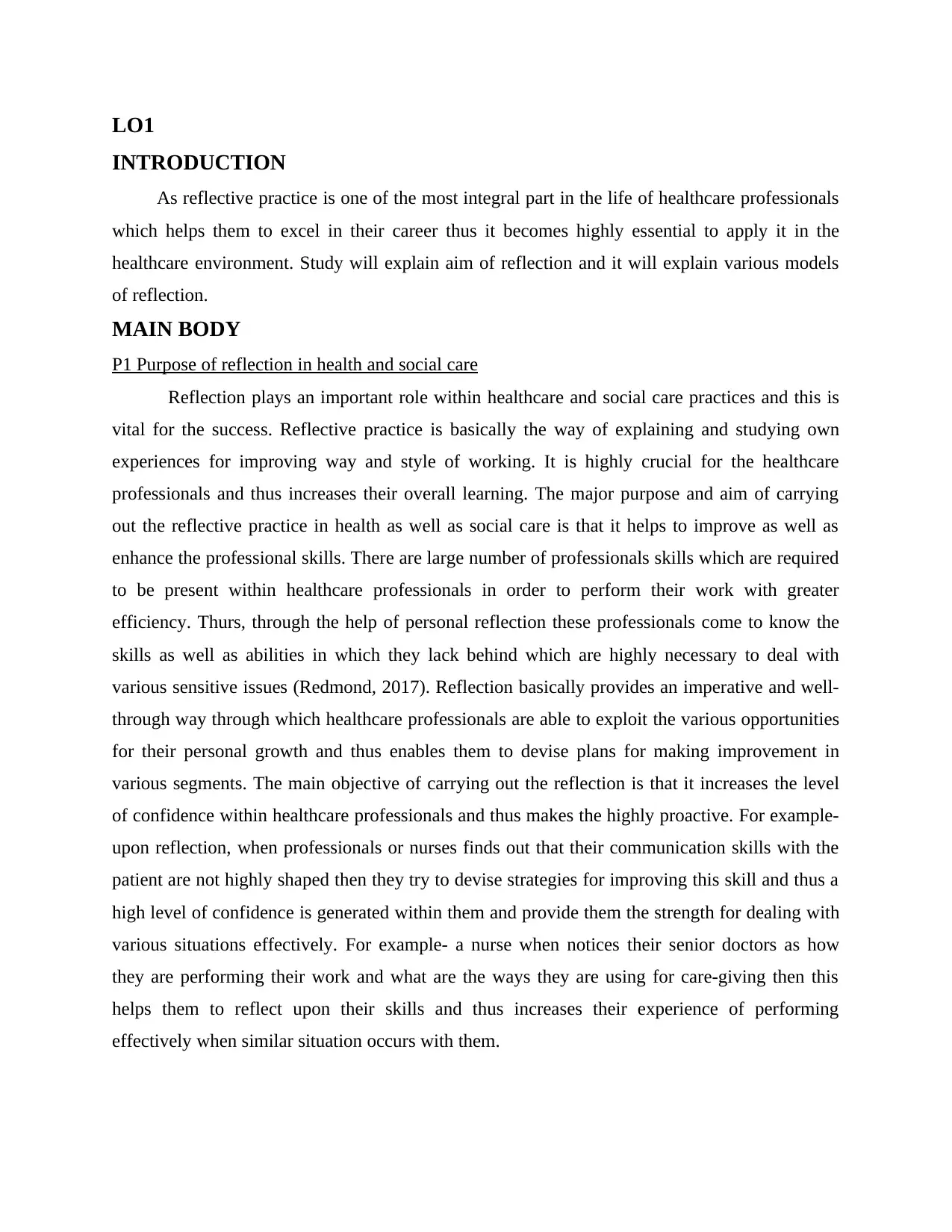
LO1
INTRODUCTION
As reflective practice is one of the most integral part in the life of healthcare professionals
which helps them to excel in their career thus it becomes highly essential to apply it in the
healthcare environment. Study will explain aim of reflection and it will explain various models
of reflection.
MAIN BODY
P1 Purpose of reflection in health and social care
Reflection plays an important role within healthcare and social care practices and this is
vital for the success. Reflective practice is basically the way of explaining and studying own
experiences for improving way and style of working. It is highly crucial for the healthcare
professionals and thus increases their overall learning. The major purpose and aim of carrying
out the reflective practice in health as well as social care is that it helps to improve as well as
enhance the professional skills. There are large number of professionals skills which are required
to be present within healthcare professionals in order to perform their work with greater
efficiency. Thurs, through the help of personal reflection these professionals come to know the
skills as well as abilities in which they lack behind which are highly necessary to deal with
various sensitive issues (Redmond, 2017). Reflection basically provides an imperative and well-
through way through which healthcare professionals are able to exploit the various opportunities
for their personal growth and thus enables them to devise plans for making improvement in
various segments. The main objective of carrying out the reflection is that it increases the level
of confidence within healthcare professionals and thus makes the highly proactive. For example-
upon reflection, when professionals or nurses finds out that their communication skills with the
patient are not highly shaped then they try to devise strategies for improving this skill and thus a
high level of confidence is generated within them and provide them the strength for dealing with
various situations effectively. For example- a nurse when notices their senior doctors as how
they are performing their work and what are the ways they are using for care-giving then this
helps them to reflect upon their skills and thus increases their experience of performing
effectively when similar situation occurs with them.
INTRODUCTION
As reflective practice is one of the most integral part in the life of healthcare professionals
which helps them to excel in their career thus it becomes highly essential to apply it in the
healthcare environment. Study will explain aim of reflection and it will explain various models
of reflection.
MAIN BODY
P1 Purpose of reflection in health and social care
Reflection plays an important role within healthcare and social care practices and this is
vital for the success. Reflective practice is basically the way of explaining and studying own
experiences for improving way and style of working. It is highly crucial for the healthcare
professionals and thus increases their overall learning. The major purpose and aim of carrying
out the reflective practice in health as well as social care is that it helps to improve as well as
enhance the professional skills. There are large number of professionals skills which are required
to be present within healthcare professionals in order to perform their work with greater
efficiency. Thurs, through the help of personal reflection these professionals come to know the
skills as well as abilities in which they lack behind which are highly necessary to deal with
various sensitive issues (Redmond, 2017). Reflection basically provides an imperative and well-
through way through which healthcare professionals are able to exploit the various opportunities
for their personal growth and thus enables them to devise plans for making improvement in
various segments. The main objective of carrying out the reflection is that it increases the level
of confidence within healthcare professionals and thus makes the highly proactive. For example-
upon reflection, when professionals or nurses finds out that their communication skills with the
patient are not highly shaped then they try to devise strategies for improving this skill and thus a
high level of confidence is generated within them and provide them the strength for dealing with
various situations effectively. For example- a nurse when notices their senior doctors as how
they are performing their work and what are the ways they are using for care-giving then this
helps them to reflect upon their skills and thus increases their experience of performing
effectively when similar situation occurs with them.
⊘ This is a preview!⊘
Do you want full access?
Subscribe today to unlock all pages.

Trusted by 1+ million students worldwide
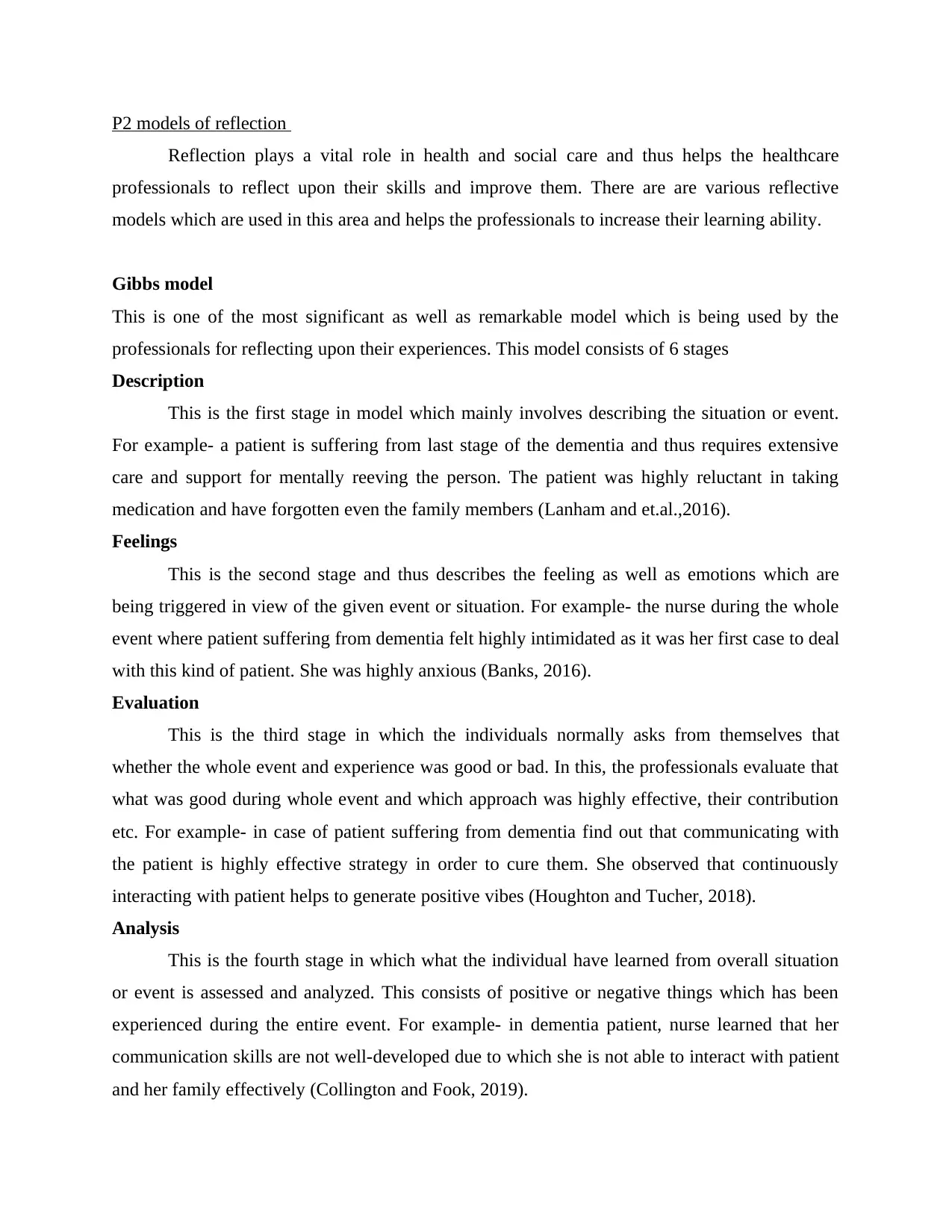
P2 models of reflection
Reflection plays a vital role in health and social care and thus helps the healthcare
professionals to reflect upon their skills and improve them. There are are various reflective
models which are used in this area and helps the professionals to increase their learning ability.
Gibbs model
This is one of the most significant as well as remarkable model which is being used by the
professionals for reflecting upon their experiences. This model consists of 6 stages
Description
This is the first stage in model which mainly involves describing the situation or event.
For example- a patient is suffering from last stage of the dementia and thus requires extensive
care and support for mentally reeving the person. The patient was highly reluctant in taking
medication and have forgotten even the family members (Lanham and et.al.,2016).
Feelings
This is the second stage and thus describes the feeling as well as emotions which are
being triggered in view of the given event or situation. For example- the nurse during the whole
event where patient suffering from dementia felt highly intimidated as it was her first case to deal
with this kind of patient. She was highly anxious (Banks, 2016).
Evaluation
This is the third stage in which the individuals normally asks from themselves that
whether the whole event and experience was good or bad. In this, the professionals evaluate that
what was good during whole event and which approach was highly effective, their contribution
etc. For example- in case of patient suffering from dementia find out that communicating with
the patient is highly effective strategy in order to cure them. She observed that continuously
interacting with patient helps to generate positive vibes (Houghton and Tucher, 2018).
Analysis
This is the fourth stage in which what the individual have learned from overall situation
or event is assessed and analyzed. This consists of positive or negative things which has been
experienced during the entire event. For example- in dementia patient, nurse learned that her
communication skills are not well-developed due to which she is not able to interact with patient
and her family effectively (Collington and Fook, 2019).
Reflection plays a vital role in health and social care and thus helps the healthcare
professionals to reflect upon their skills and improve them. There are are various reflective
models which are used in this area and helps the professionals to increase their learning ability.
Gibbs model
This is one of the most significant as well as remarkable model which is being used by the
professionals for reflecting upon their experiences. This model consists of 6 stages
Description
This is the first stage in model which mainly involves describing the situation or event.
For example- a patient is suffering from last stage of the dementia and thus requires extensive
care and support for mentally reeving the person. The patient was highly reluctant in taking
medication and have forgotten even the family members (Lanham and et.al.,2016).
Feelings
This is the second stage and thus describes the feeling as well as emotions which are
being triggered in view of the given event or situation. For example- the nurse during the whole
event where patient suffering from dementia felt highly intimidated as it was her first case to deal
with this kind of patient. She was highly anxious (Banks, 2016).
Evaluation
This is the third stage in which the individuals normally asks from themselves that
whether the whole event and experience was good or bad. In this, the professionals evaluate that
what was good during whole event and which approach was highly effective, their contribution
etc. For example- in case of patient suffering from dementia find out that communicating with
the patient is highly effective strategy in order to cure them. She observed that continuously
interacting with patient helps to generate positive vibes (Houghton and Tucher, 2018).
Analysis
This is the fourth stage in which what the individual have learned from overall situation
or event is assessed and analyzed. This consists of positive or negative things which has been
experienced during the entire event. For example- in dementia patient, nurse learned that her
communication skills are not well-developed due to which she is not able to interact with patient
and her family effectively (Collington and Fook, 2019).
Paraphrase This Document
Need a fresh take? Get an instant paraphrase of this document with our AI Paraphraser
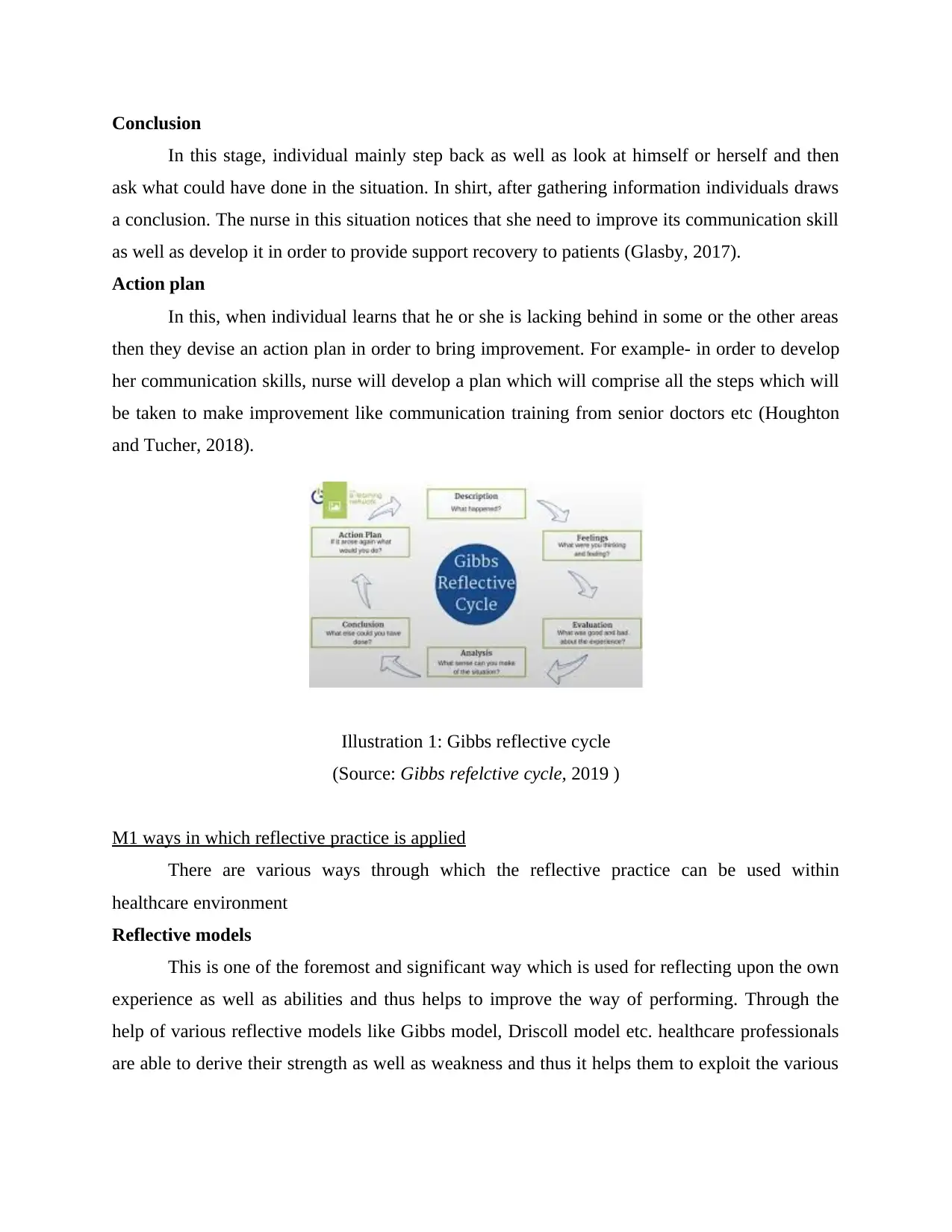
Conclusion
In this stage, individual mainly step back as well as look at himself or herself and then
ask what could have done in the situation. In shirt, after gathering information individuals draws
a conclusion. The nurse in this situation notices that she need to improve its communication skill
as well as develop it in order to provide support recovery to patients (Glasby, 2017).
Action plan
In this, when individual learns that he or she is lacking behind in some or the other areas
then they devise an action plan in order to bring improvement. For example- in order to develop
her communication skills, nurse will develop a plan which will comprise all the steps which will
be taken to make improvement like communication training from senior doctors etc (Houghton
and Tucher, 2018).
Illustration 1: Gibbs reflective cycle
(Source: Gibbs refelctive cycle, 2019 )
M1 ways in which reflective practice is applied
There are various ways through which the reflective practice can be used within
healthcare environment
Reflective models
This is one of the foremost and significant way which is used for reflecting upon the own
experience as well as abilities and thus helps to improve the way of performing. Through the
help of various reflective models like Gibbs model, Driscoll model etc. healthcare professionals
are able to derive their strength as well as weakness and thus it helps them to exploit the various
In this stage, individual mainly step back as well as look at himself or herself and then
ask what could have done in the situation. In shirt, after gathering information individuals draws
a conclusion. The nurse in this situation notices that she need to improve its communication skill
as well as develop it in order to provide support recovery to patients (Glasby, 2017).
Action plan
In this, when individual learns that he or she is lacking behind in some or the other areas
then they devise an action plan in order to bring improvement. For example- in order to develop
her communication skills, nurse will develop a plan which will comprise all the steps which will
be taken to make improvement like communication training from senior doctors etc (Houghton
and Tucher, 2018).
Illustration 1: Gibbs reflective cycle
(Source: Gibbs refelctive cycle, 2019 )
M1 ways in which reflective practice is applied
There are various ways through which the reflective practice can be used within
healthcare environment
Reflective models
This is one of the foremost and significant way which is used for reflecting upon the own
experience as well as abilities and thus helps to improve the way of performing. Through the
help of various reflective models like Gibbs model, Driscoll model etc. healthcare professionals
are able to derive their strength as well as weakness and thus it helps them to exploit the various
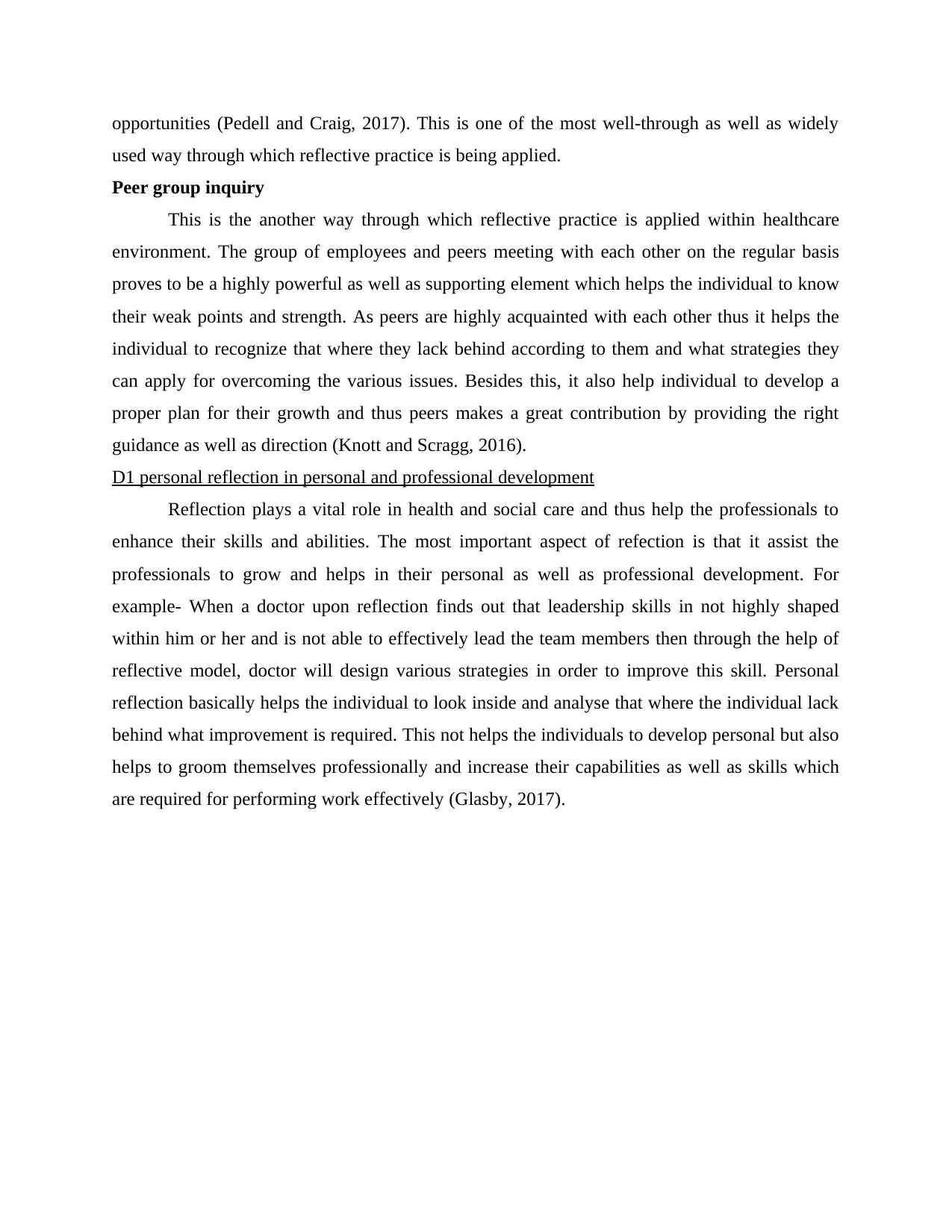
opportunities (Pedell and Craig, 2017). This is one of the most well-through as well as widely
used way through which reflective practice is being applied.
Peer group inquiry
This is the another way through which reflective practice is applied within healthcare
environment. The group of employees and peers meeting with each other on the regular basis
proves to be a highly powerful as well as supporting element which helps the individual to know
their weak points and strength. As peers are highly acquainted with each other thus it helps the
individual to recognize that where they lack behind according to them and what strategies they
can apply for overcoming the various issues. Besides this, it also help individual to develop a
proper plan for their growth and thus peers makes a great contribution by providing the right
guidance as well as direction (Knott and Scragg, 2016).
D1 personal reflection in personal and professional development
Reflection plays a vital role in health and social care and thus help the professionals to
enhance their skills and abilities. The most important aspect of refection is that it assist the
professionals to grow and helps in their personal as well as professional development. For
example- When a doctor upon reflection finds out that leadership skills in not highly shaped
within him or her and is not able to effectively lead the team members then through the help of
reflective model, doctor will design various strategies in order to improve this skill. Personal
reflection basically helps the individual to look inside and analyse that where the individual lack
behind what improvement is required. This not helps the individuals to develop personal but also
helps to groom themselves professionally and increase their capabilities as well as skills which
are required for performing work effectively (Glasby, 2017).
used way through which reflective practice is being applied.
Peer group inquiry
This is the another way through which reflective practice is applied within healthcare
environment. The group of employees and peers meeting with each other on the regular basis
proves to be a highly powerful as well as supporting element which helps the individual to know
their weak points and strength. As peers are highly acquainted with each other thus it helps the
individual to recognize that where they lack behind according to them and what strategies they
can apply for overcoming the various issues. Besides this, it also help individual to develop a
proper plan for their growth and thus peers makes a great contribution by providing the right
guidance as well as direction (Knott and Scragg, 2016).
D1 personal reflection in personal and professional development
Reflection plays a vital role in health and social care and thus help the professionals to
enhance their skills and abilities. The most important aspect of refection is that it assist the
professionals to grow and helps in their personal as well as professional development. For
example- When a doctor upon reflection finds out that leadership skills in not highly shaped
within him or her and is not able to effectively lead the team members then through the help of
reflective model, doctor will design various strategies in order to improve this skill. Personal
reflection basically helps the individual to look inside and analyse that where the individual lack
behind what improvement is required. This not helps the individuals to develop personal but also
helps to groom themselves professionally and increase their capabilities as well as skills which
are required for performing work effectively (Glasby, 2017).
⊘ This is a preview!⊘
Do you want full access?
Subscribe today to unlock all pages.

Trusted by 1+ million students worldwide
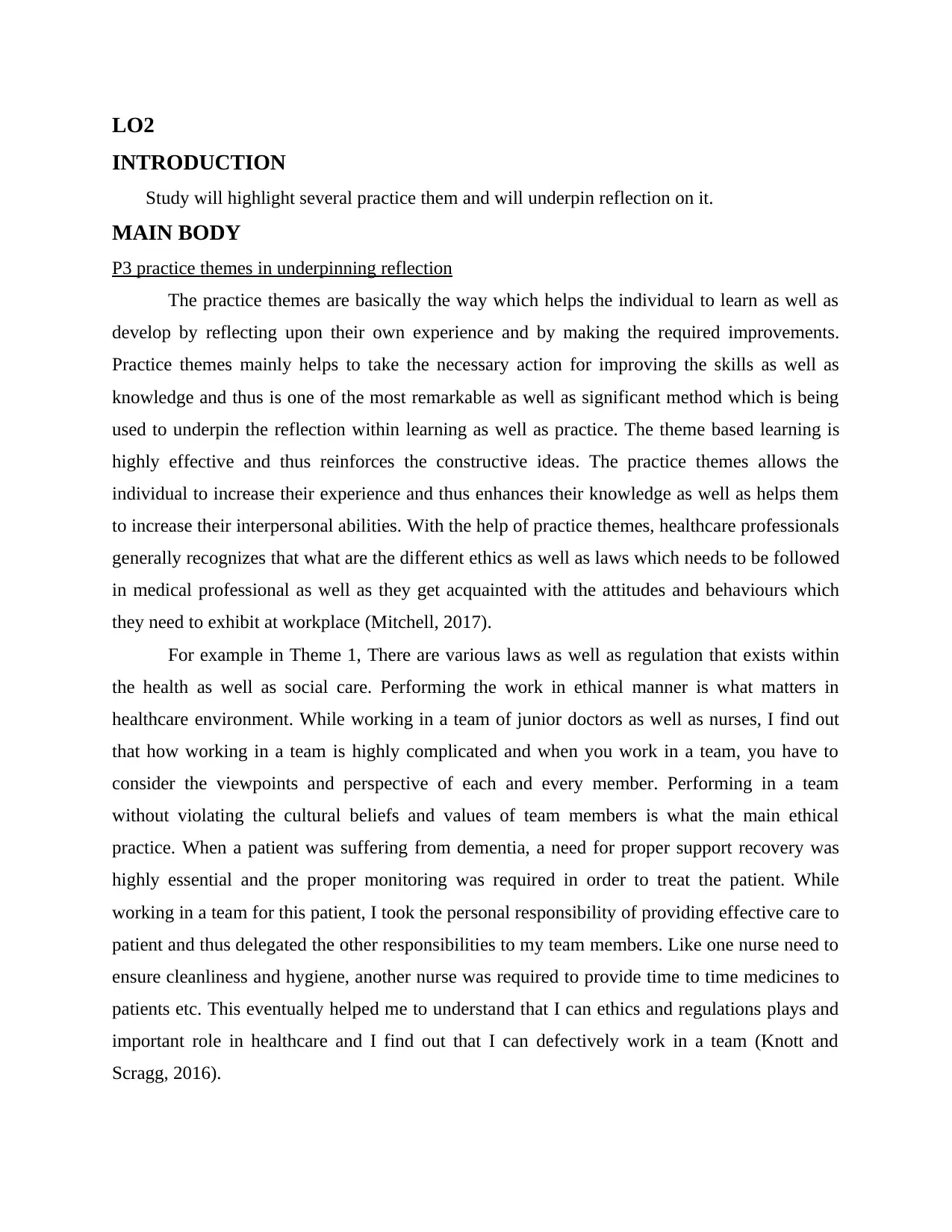
LO2
INTRODUCTION
Study will highlight several practice them and will underpin reflection on it.
MAIN BODY
P3 practice themes in underpinning reflection
The practice themes are basically the way which helps the individual to learn as well as
develop by reflecting upon their own experience and by making the required improvements.
Practice themes mainly helps to take the necessary action for improving the skills as well as
knowledge and thus is one of the most remarkable as well as significant method which is being
used to underpin the reflection within learning as well as practice. The theme based learning is
highly effective and thus reinforces the constructive ideas. The practice themes allows the
individual to increase their experience and thus enhances their knowledge as well as helps them
to increase their interpersonal abilities. With the help of practice themes, healthcare professionals
generally recognizes that what are the different ethics as well as laws which needs to be followed
in medical professional as well as they get acquainted with the attitudes and behaviours which
they need to exhibit at workplace (Mitchell, 2017).
For example in Theme 1, There are various laws as well as regulation that exists within
the health as well as social care. Performing the work in ethical manner is what matters in
healthcare environment. While working in a team of junior doctors as well as nurses, I find out
that how working in a team is highly complicated and when you work in a team, you have to
consider the viewpoints and perspective of each and every member. Performing in a team
without violating the cultural beliefs and values of team members is what the main ethical
practice. When a patient was suffering from dementia, a need for proper support recovery was
highly essential and the proper monitoring was required in order to treat the patient. While
working in a team for this patient, I took the personal responsibility of providing effective care to
patient and thus delegated the other responsibilities to my team members. Like one nurse need to
ensure cleanliness and hygiene, another nurse was required to provide time to time medicines to
patients etc. This eventually helped me to understand that I can ethics and regulations plays and
important role in healthcare and I find out that I can defectively work in a team (Knott and
Scragg, 2016).
INTRODUCTION
Study will highlight several practice them and will underpin reflection on it.
MAIN BODY
P3 practice themes in underpinning reflection
The practice themes are basically the way which helps the individual to learn as well as
develop by reflecting upon their own experience and by making the required improvements.
Practice themes mainly helps to take the necessary action for improving the skills as well as
knowledge and thus is one of the most remarkable as well as significant method which is being
used to underpin the reflection within learning as well as practice. The theme based learning is
highly effective and thus reinforces the constructive ideas. The practice themes allows the
individual to increase their experience and thus enhances their knowledge as well as helps them
to increase their interpersonal abilities. With the help of practice themes, healthcare professionals
generally recognizes that what are the different ethics as well as laws which needs to be followed
in medical professional as well as they get acquainted with the attitudes and behaviours which
they need to exhibit at workplace (Mitchell, 2017).
For example in Theme 1, There are various laws as well as regulation that exists within
the health as well as social care. Performing the work in ethical manner is what matters in
healthcare environment. While working in a team of junior doctors as well as nurses, I find out
that how working in a team is highly complicated and when you work in a team, you have to
consider the viewpoints and perspective of each and every member. Performing in a team
without violating the cultural beliefs and values of team members is what the main ethical
practice. When a patient was suffering from dementia, a need for proper support recovery was
highly essential and the proper monitoring was required in order to treat the patient. While
working in a team for this patient, I took the personal responsibility of providing effective care to
patient and thus delegated the other responsibilities to my team members. Like one nurse need to
ensure cleanliness and hygiene, another nurse was required to provide time to time medicines to
patients etc. This eventually helped me to understand that I can ethics and regulations plays and
important role in healthcare and I find out that I can defectively work in a team (Knott and
Scragg, 2016).
Paraphrase This Document
Need a fresh take? Get an instant paraphrase of this document with our AI Paraphraser
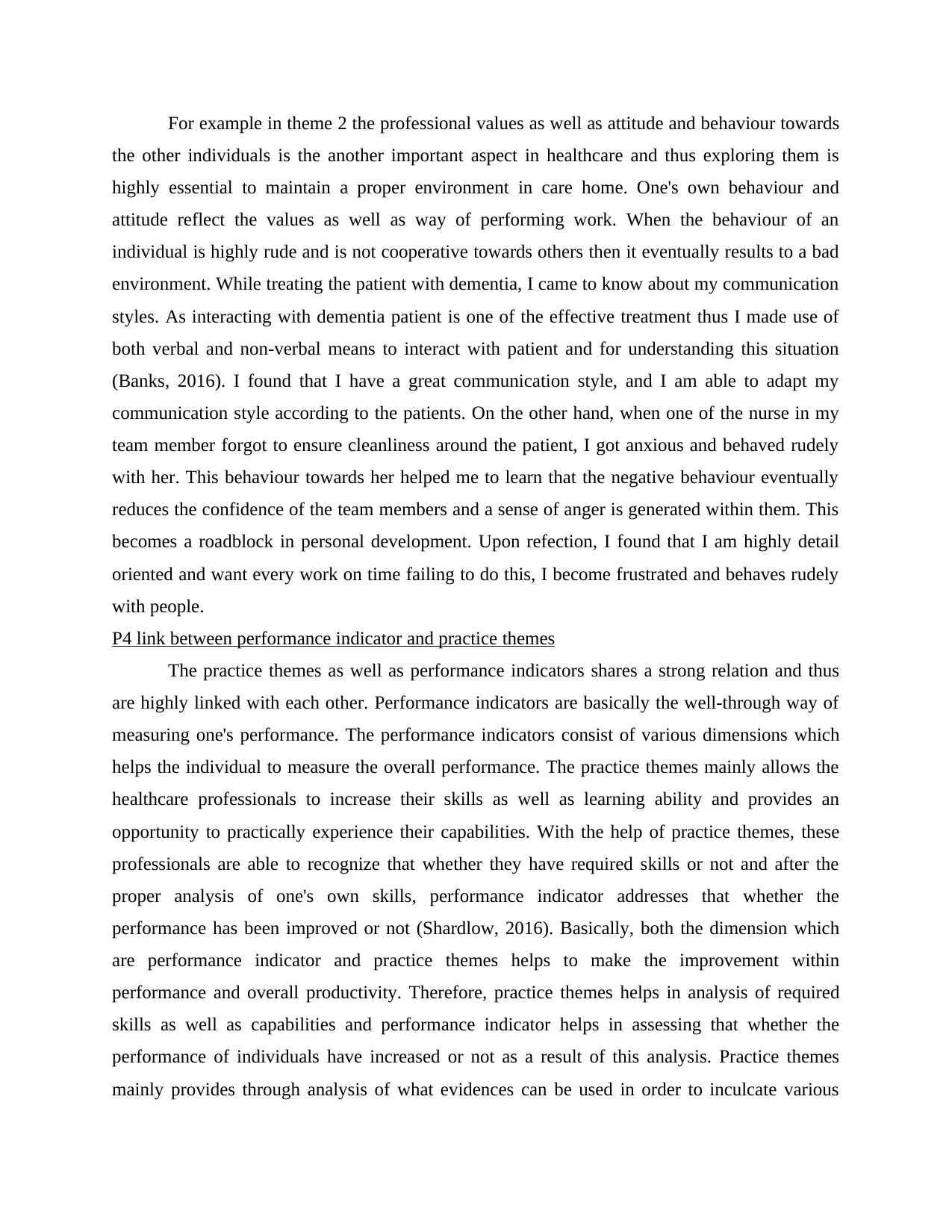
For example in theme 2 the professional values as well as attitude and behaviour towards
the other individuals is the another important aspect in healthcare and thus exploring them is
highly essential to maintain a proper environment in care home. One's own behaviour and
attitude reflect the values as well as way of performing work. When the behaviour of an
individual is highly rude and is not cooperative towards others then it eventually results to a bad
environment. While treating the patient with dementia, I came to know about my communication
styles. As interacting with dementia patient is one of the effective treatment thus I made use of
both verbal and non-verbal means to interact with patient and for understanding this situation
(Banks, 2016). I found that I have a great communication style, and I am able to adapt my
communication style according to the patients. On the other hand, when one of the nurse in my
team member forgot to ensure cleanliness around the patient, I got anxious and behaved rudely
with her. This behaviour towards her helped me to learn that the negative behaviour eventually
reduces the confidence of the team members and a sense of anger is generated within them. This
becomes a roadblock in personal development. Upon refection, I found that I am highly detail
oriented and want every work on time failing to do this, I become frustrated and behaves rudely
with people.
P4 link between performance indicator and practice themes
The practice themes as well as performance indicators shares a strong relation and thus
are highly linked with each other. Performance indicators are basically the well-through way of
measuring one's performance. The performance indicators consist of various dimensions which
helps the individual to measure the overall performance. The practice themes mainly allows the
healthcare professionals to increase their skills as well as learning ability and provides an
opportunity to practically experience their capabilities. With the help of practice themes, these
professionals are able to recognize that whether they have required skills or not and after the
proper analysis of one's own skills, performance indicator addresses that whether the
performance has been improved or not (Shardlow, 2016). Basically, both the dimension which
are performance indicator and practice themes helps to make the improvement within
performance and overall productivity. Therefore, practice themes helps in analysis of required
skills as well as capabilities and performance indicator helps in assessing that whether the
performance of individuals have increased or not as a result of this analysis. Practice themes
mainly provides through analysis of what evidences can be used in order to inculcate various
the other individuals is the another important aspect in healthcare and thus exploring them is
highly essential to maintain a proper environment in care home. One's own behaviour and
attitude reflect the values as well as way of performing work. When the behaviour of an
individual is highly rude and is not cooperative towards others then it eventually results to a bad
environment. While treating the patient with dementia, I came to know about my communication
styles. As interacting with dementia patient is one of the effective treatment thus I made use of
both verbal and non-verbal means to interact with patient and for understanding this situation
(Banks, 2016). I found that I have a great communication style, and I am able to adapt my
communication style according to the patients. On the other hand, when one of the nurse in my
team member forgot to ensure cleanliness around the patient, I got anxious and behaved rudely
with her. This behaviour towards her helped me to learn that the negative behaviour eventually
reduces the confidence of the team members and a sense of anger is generated within them. This
becomes a roadblock in personal development. Upon refection, I found that I am highly detail
oriented and want every work on time failing to do this, I become frustrated and behaves rudely
with people.
P4 link between performance indicator and practice themes
The practice themes as well as performance indicators shares a strong relation and thus
are highly linked with each other. Performance indicators are basically the well-through way of
measuring one's performance. The performance indicators consist of various dimensions which
helps the individual to measure the overall performance. The practice themes mainly allows the
healthcare professionals to increase their skills as well as learning ability and provides an
opportunity to practically experience their capabilities. With the help of practice themes, these
professionals are able to recognize that whether they have required skills or not and after the
proper analysis of one's own skills, performance indicator addresses that whether the
performance has been improved or not (Shardlow, 2016). Basically, both the dimension which
are performance indicator and practice themes helps to make the improvement within
performance and overall productivity. Therefore, practice themes helps in analysis of required
skills as well as capabilities and performance indicator helps in assessing that whether the
performance of individuals have increased or not as a result of this analysis. Practice themes
mainly provides through analysis of what evidences can be used in order to inculcate various
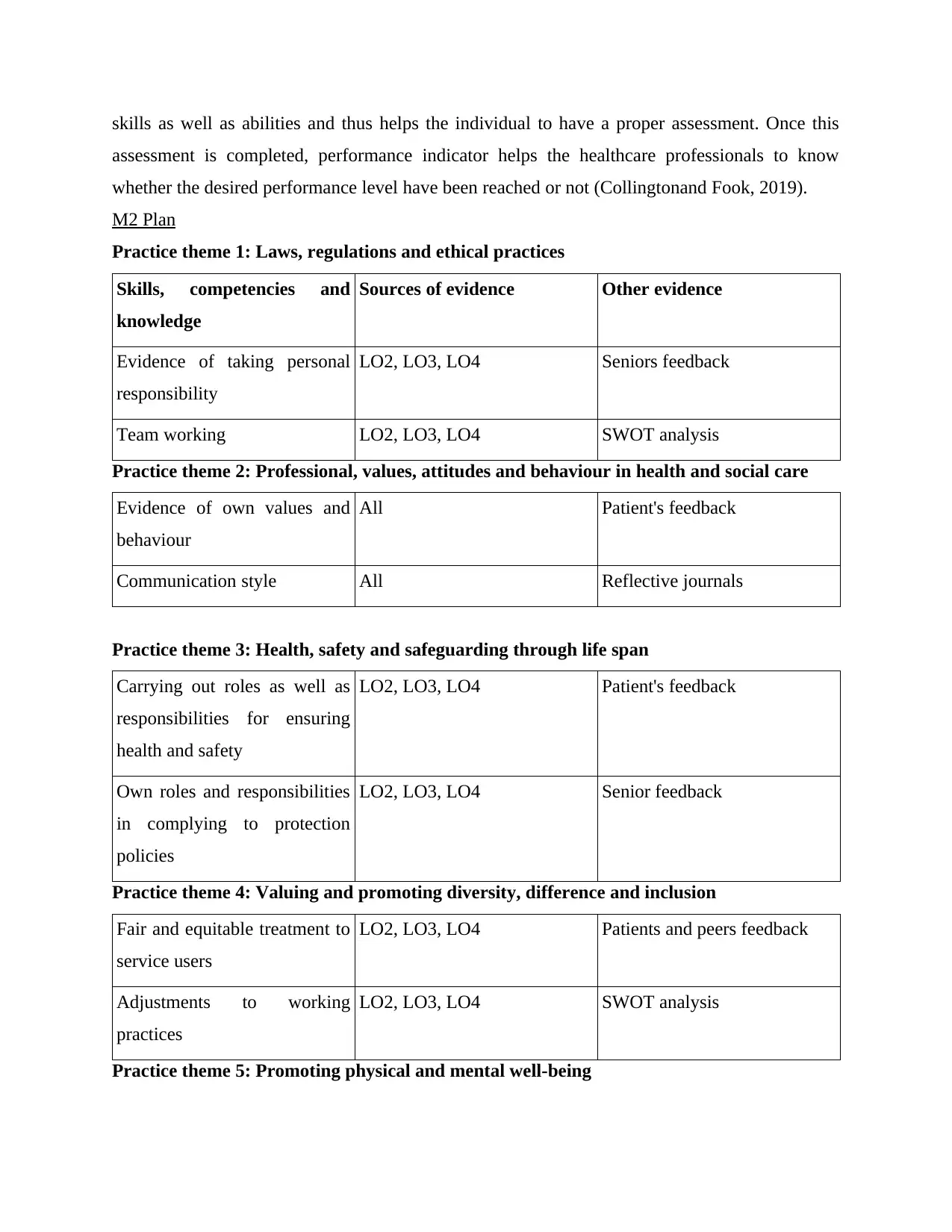
skills as well as abilities and thus helps the individual to have a proper assessment. Once this
assessment is completed, performance indicator helps the healthcare professionals to know
whether the desired performance level have been reached or not (Collingtonand Fook, 2019).
M2 Plan
Practice theme 1: Laws, regulations and ethical practices
Skills, competencies and
knowledge
Sources of evidence Other evidence
Evidence of taking personal
responsibility
LO2, LO3, LO4 Seniors feedback
Team working LO2, LO3, LO4 SWOT analysis
Practice theme 2: Professional, values, attitudes and behaviour in health and social care
Evidence of own values and
behaviour
All Patient's feedback
Communication style All Reflective journals
Practice theme 3: Health, safety and safeguarding through life span
Carrying out roles as well as
responsibilities for ensuring
health and safety
LO2, LO3, LO4 Patient's feedback
Own roles and responsibilities
in complying to protection
policies
LO2, LO3, LO4 Senior feedback
Practice theme 4: Valuing and promoting diversity, difference and inclusion
Fair and equitable treatment to
service users
LO2, LO3, LO4 Patients and peers feedback
Adjustments to working
practices
LO2, LO3, LO4 SWOT analysis
Practice theme 5: Promoting physical and mental well-being
assessment is completed, performance indicator helps the healthcare professionals to know
whether the desired performance level have been reached or not (Collingtonand Fook, 2019).
M2 Plan
Practice theme 1: Laws, regulations and ethical practices
Skills, competencies and
knowledge
Sources of evidence Other evidence
Evidence of taking personal
responsibility
LO2, LO3, LO4 Seniors feedback
Team working LO2, LO3, LO4 SWOT analysis
Practice theme 2: Professional, values, attitudes and behaviour in health and social care
Evidence of own values and
behaviour
All Patient's feedback
Communication style All Reflective journals
Practice theme 3: Health, safety and safeguarding through life span
Carrying out roles as well as
responsibilities for ensuring
health and safety
LO2, LO3, LO4 Patient's feedback
Own roles and responsibilities
in complying to protection
policies
LO2, LO3, LO4 Senior feedback
Practice theme 4: Valuing and promoting diversity, difference and inclusion
Fair and equitable treatment to
service users
LO2, LO3, LO4 Patients and peers feedback
Adjustments to working
practices
LO2, LO3, LO4 SWOT analysis
Practice theme 5: Promoting physical and mental well-being
⊘ This is a preview!⊘
Do you want full access?
Subscribe today to unlock all pages.

Trusted by 1+ million students worldwide
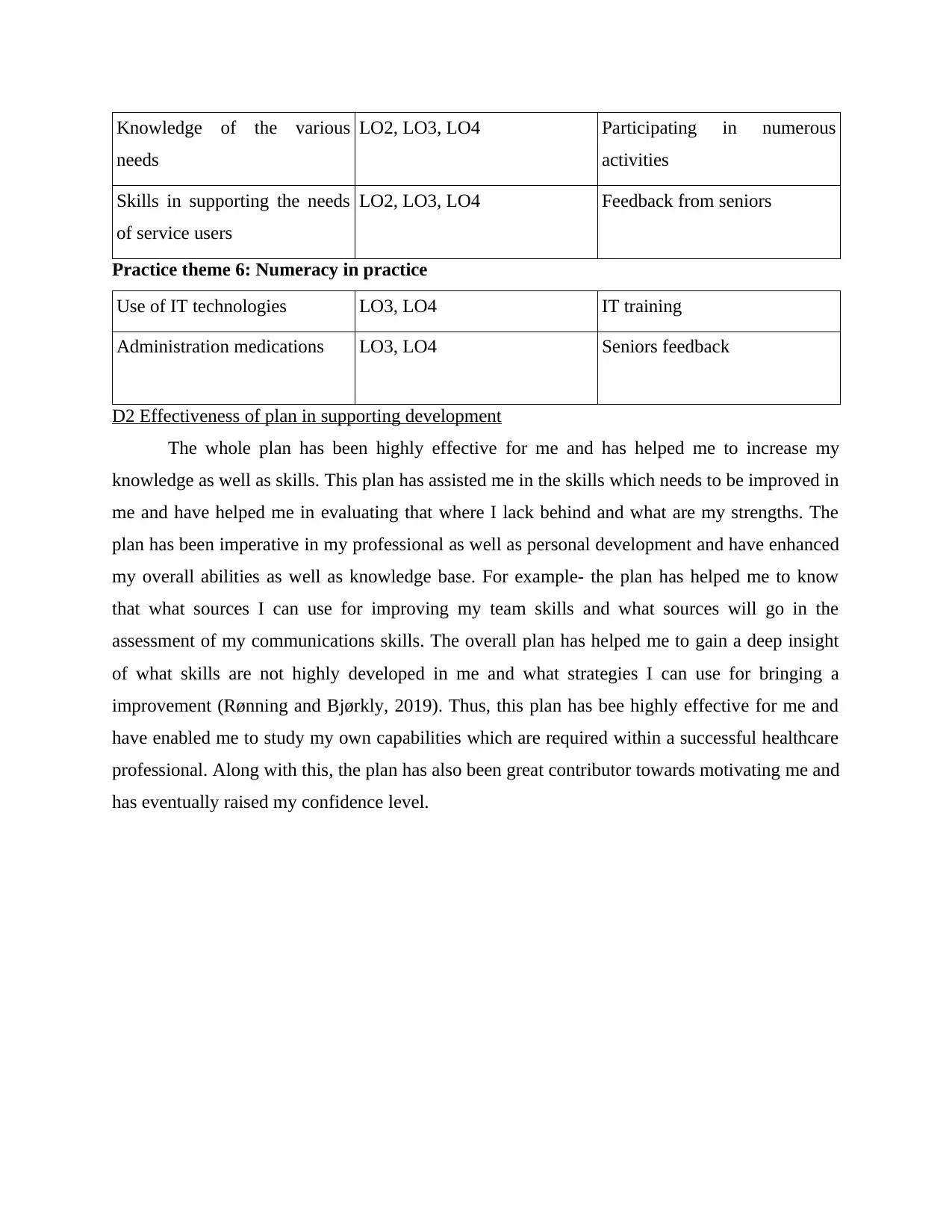
Knowledge of the various
needs
LO2, LO3, LO4 Participating in numerous
activities
Skills in supporting the needs
of service users
LO2, LO3, LO4 Feedback from seniors
Practice theme 6: Numeracy in practice
Use of IT technologies LO3, LO4 IT training
Administration medications LO3, LO4 Seniors feedback
D2 Effectiveness of plan in supporting development
The whole plan has been highly effective for me and has helped me to increase my
knowledge as well as skills. This plan has assisted me in the skills which needs to be improved in
me and have helped me in evaluating that where I lack behind and what are my strengths. The
plan has been imperative in my professional as well as personal development and have enhanced
my overall abilities as well as knowledge base. For example- the plan has helped me to know
that what sources I can use for improving my team skills and what sources will go in the
assessment of my communications skills. The overall plan has helped me to gain a deep insight
of what skills are not highly developed in me and what strategies I can use for bringing a
improvement (Rønning and Bjørkly, 2019). Thus, this plan has bee highly effective for me and
have enabled me to study my own capabilities which are required within a successful healthcare
professional. Along with this, the plan has also been great contributor towards motivating me and
has eventually raised my confidence level.
needs
LO2, LO3, LO4 Participating in numerous
activities
Skills in supporting the needs
of service users
LO2, LO3, LO4 Feedback from seniors
Practice theme 6: Numeracy in practice
Use of IT technologies LO3, LO4 IT training
Administration medications LO3, LO4 Seniors feedback
D2 Effectiveness of plan in supporting development
The whole plan has been highly effective for me and has helped me to increase my
knowledge as well as skills. This plan has assisted me in the skills which needs to be improved in
me and have helped me in evaluating that where I lack behind and what are my strengths. The
plan has been imperative in my professional as well as personal development and have enhanced
my overall abilities as well as knowledge base. For example- the plan has helped me to know
that what sources I can use for improving my team skills and what sources will go in the
assessment of my communications skills. The overall plan has helped me to gain a deep insight
of what skills are not highly developed in me and what strategies I can use for bringing a
improvement (Rønning and Bjørkly, 2019). Thus, this plan has bee highly effective for me and
have enabled me to study my own capabilities which are required within a successful healthcare
professional. Along with this, the plan has also been great contributor towards motivating me and
has eventually raised my confidence level.
Paraphrase This Document
Need a fresh take? Get an instant paraphrase of this document with our AI Paraphraser
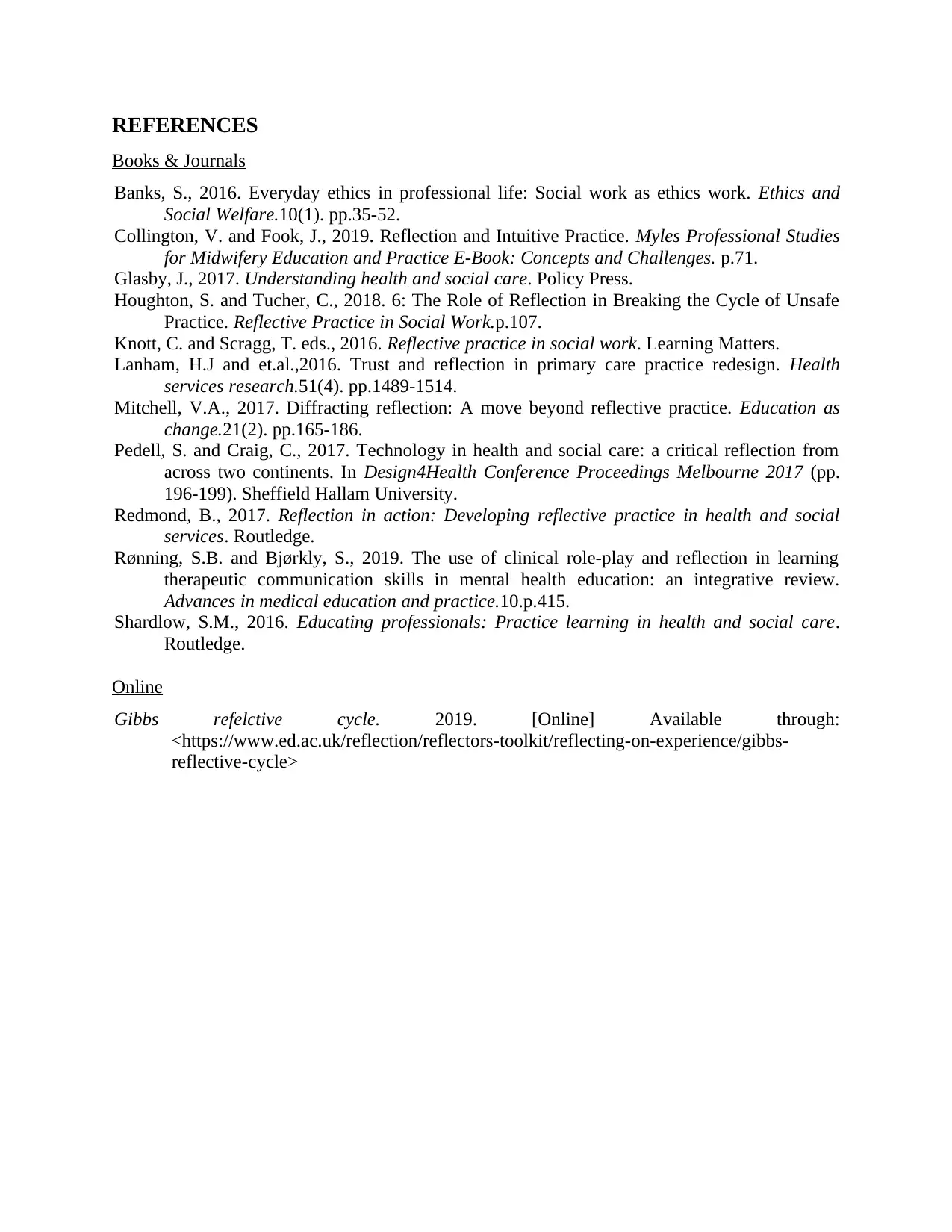
REFERENCES
Books & Journals
Banks, S., 2016. Everyday ethics in professional life: Social work as ethics work. Ethics and
Social Welfare.10(1). pp.35-52.
Collington, V. and Fook, J., 2019. Reflection and Intuitive Practice. Myles Professional Studies
for Midwifery Education and Practice E-Book: Concepts and Challenges. p.71.
Glasby, J., 2017. Understanding health and social care. Policy Press.
Houghton, S. and Tucher, C., 2018. 6: The Role of Reflection in Breaking the Cycle of Unsafe
Practice. Reflective Practice in Social Work.p.107.
Knott, C. and Scragg, T. eds., 2016. Reflective practice in social work. Learning Matters.
Lanham, H.J and et.al.,2016. Trust and reflection in primary care practice redesign. Health
services research.51(4). pp.1489-1514.
Mitchell, V.A., 2017. Diffracting reflection: A move beyond reflective practice. Education as
change.21(2). pp.165-186.
Pedell, S. and Craig, C., 2017. Technology in health and social care: a critical reflection from
across two continents. In Design4Health Conference Proceedings Melbourne 2017 (pp.
196-199). Sheffield Hallam University.
Redmond, B., 2017. Reflection in action: Developing reflective practice in health and social
services. Routledge.
Rønning, S.B. and Bjørkly, S., 2019. The use of clinical role-play and reflection in learning
therapeutic communication skills in mental health education: an integrative review.
Advances in medical education and practice.10.p.415.
Shardlow, S.M., 2016. Educating professionals: Practice learning in health and social care.
Routledge.
Online
Gibbs refelctive cycle. 2019. [Online] Available through:
<https://www.ed.ac.uk/reflection/reflectors-toolkit/reflecting-on-experience/gibbs-
reflective-cycle>
Books & Journals
Banks, S., 2016. Everyday ethics in professional life: Social work as ethics work. Ethics and
Social Welfare.10(1). pp.35-52.
Collington, V. and Fook, J., 2019. Reflection and Intuitive Practice. Myles Professional Studies
for Midwifery Education and Practice E-Book: Concepts and Challenges. p.71.
Glasby, J., 2017. Understanding health and social care. Policy Press.
Houghton, S. and Tucher, C., 2018. 6: The Role of Reflection in Breaking the Cycle of Unsafe
Practice. Reflective Practice in Social Work.p.107.
Knott, C. and Scragg, T. eds., 2016. Reflective practice in social work. Learning Matters.
Lanham, H.J and et.al.,2016. Trust and reflection in primary care practice redesign. Health
services research.51(4). pp.1489-1514.
Mitchell, V.A., 2017. Diffracting reflection: A move beyond reflective practice. Education as
change.21(2). pp.165-186.
Pedell, S. and Craig, C., 2017. Technology in health and social care: a critical reflection from
across two continents. In Design4Health Conference Proceedings Melbourne 2017 (pp.
196-199). Sheffield Hallam University.
Redmond, B., 2017. Reflection in action: Developing reflective practice in health and social
services. Routledge.
Rønning, S.B. and Bjørkly, S., 2019. The use of clinical role-play and reflection in learning
therapeutic communication skills in mental health education: an integrative review.
Advances in medical education and practice.10.p.415.
Shardlow, S.M., 2016. Educating professionals: Practice learning in health and social care.
Routledge.
Online
Gibbs refelctive cycle. 2019. [Online] Available through:
<https://www.ed.ac.uk/reflection/reflectors-toolkit/reflecting-on-experience/gibbs-
reflective-cycle>
1 out of 11
Related Documents
Your All-in-One AI-Powered Toolkit for Academic Success.
+13062052269
info@desklib.com
Available 24*7 on WhatsApp / Email
![[object Object]](/_next/static/media/star-bottom.7253800d.svg)
Unlock your academic potential
Copyright © 2020–2026 A2Z Services. All Rights Reserved. Developed and managed by ZUCOL.





